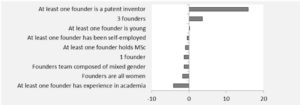A talk by Dr Jault with advices to unlock your potential on innovative projects.
Le Belvédère, April 9th 2018
A talk by Dr Jault with advices to unlock your potential on innovative projects.
Le Belvédère, April 9th 2018
Quaterly compendium of biosciences industry perspectives, Q2 April 2018
Venture capitals in Biotechs
Last Healthcare Investments and Exits report (SVB annual report, 2018) analyzed activity of biosciences companies with venture capital investment. U.S. healthcare venture fundraising reached $9.1 billion in 2017, it is the biggest capacity of investment in the life sciences sector in the world. IPOs and M&A activities in Oncology represent 36% of all exits in 2017. VCs represent 60% of most active investors.
Ranking of American VCs specialized in Biotechs (Biotechbourse, HedgeMind, January 31st 2018)

A portrait of innovative start-ups across countries: Success factors, OECD Science 2018
A recent report (OECD iLibrary, February 2018) presents new cross-country descriptive evidence on innovative start-ups and related VC investments. This report relies on the analysis of a micro-level Crunchbase database encompassing many countries & sectors.
Firms founded by a team of individuals are more likely to receive VC funding (higher number of funding rounds and a greater amount of VC funding). Previous experience in entrepreneurship and in academia increases the probability of getting VC funding and to be acquired.
Start-ups’ patent applications are positively associated with the probability of getting VC, and negatively associated with the number of funding rounds and with the probability of IPO, and to a lesser extent with probability of acquisition. Companies where at least one founder is a patent inventor are more likely to experience a successful exit or file a patent application. Also, in general, VC funding is positively associated with successful exit.
LASSO regressions, across all sectors & countries, of amount of funding on set of firms and founders characteristics:

Extraterritorial US laws which impact global trade
Nowadays, industry has to be aware of the very broad scope of US laws in international trades. Export Administration Regulation (EAR) controls export equipments and technologies including software and technology that are licensed to other countries. The same scheme exists for military technologies but it includes also non military technologies alike commercial information satellite, bioproduction equipment (USLM Cateogry XIV) or trubine engine (USLM Category XIX) (March 15, 2018, CRS report : Export Control System). Liability for the disclosure of controlled technical data includes 20 years imprisonment and penalties up to $1,000,000 per violation (IEEPA sanctions 50 U.S.C. 1705(b)).
This sword of Damocles is applicable likewise for misconduct in business practices with criminal penalties of several million and imprisonment of maximum 20 years. For example VimpelCom paid $795 million global settlement for FCPA violations to win business in Uzbekistan. Or BNY Mellon paid $14.8 million because it had provided student internships to middle East family members of government officials (March 15, 2016, CRS report : FCPA). Total sanctions in 2016 raised to $2,4 Billion (Standford FCPA observatory) and denouncement is rewarded with whistleblower award of $83 million to note in March 2018 (March 19, 2018, FCPA blog). In 2017, 3 non US countries are main information providers for FCPA violations : UK (84 #tips) , Canada (73) and Australia (48) (SEC Annual Report 2017, page 33).
Regarding investment, any buy of 10% in shares in a strategic US company needs approbation of the Committee on Foreign Investment in the United States (CFIUS). The CFIUS investigates the operation using all appropriate intelligence agencies and can block and postpone transaction. The most controversial feature of this arrangement (called the Byrd amendment) allows CFIUS to reopen a review of the deal and to overturn its approval at any time if CFIUS believed the companies “materially fail to comply « with the terms of the arrangement (March 13, 2018, CRS report : CFIUS).
In conclusion now, non-US companies try more and more to rely on technologies that do not include US patents. And now companies need to build tactics to prevent FCPA damages alike TEVA which paid $519 Million in December 2016 (SEC Release, December 22, 2016) and now which is collapsing and announcing a 14 000 layoff plan (The New York Times, December 27, 2017).
Le Belvédère, April 23rd2018